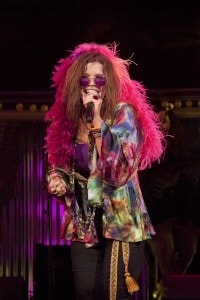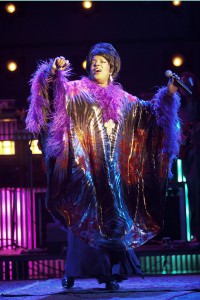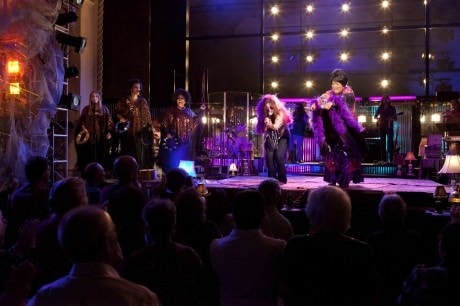After a critically acclaimed run at Arena Stage last October One Night with Janis Joplin is back. I asked Director Randy Johnson about the new production about to open at Arena Stage an how the show has evolved since he first wrote it and directed it.
Joel: Since One Night with Janis Joplin made its first stop at Arena Stage in October 2012 to critical acclaim and loudly cheering audiences, what has changed with the show? Have you added or taken out any of the songs we heard during the last production at Arena Stage, and/ or have you added some new ones?

Randy: I made some minor revisions to the script and score – it’s around 10 minutes shorter but the content is stronger and more compact. It’s just part of my process as the show continues to grow – it’s a living process of creation and growth. The amazing part of this creative journey is that this show while in production has literally been revised and developed in performances over the past two and a half years. Over 400,000 people have attended the show since its inception – the audiences’ remarkable reaction to the show, the repeat business and the comments made in the lobby are all paid attention to. My extraordinary team of the Joplin Family, Jeff Jampol (Manager of the Joplin Estate), all of the Artistic Directors where the show has played across the country, and our terrific lead producers Todd Gershwin and Daniel Chilewich of Premiere Media, have all played a significant role with their support, insight, and suggestions by providing a safe, healthy and positive creative environment for the production and myself – it really does take a village of supportive colleagues. I continue to be most grateful and appreciative to all of them.
What is it about Janis Joplin that launched you on this journey to create, write, and direct One Night with Janis Joplin?
One of the first albums I heard as a child was Janis Joplin’s Cheap Thrills – it struck me deeply and I identified with her and the album beyond reason for a five year old. I was and still am drawn to artists that tell the truth in their music without artifice or contrivance. I believe the way I identify with Janis Joplin is virtually the same for all who listen to her all these years later and come to our show – not only does she sing from the depths of her soul, but she speaks from a deep inner knowing about life and the path we are all on as individuals. By the time we open at Arena Stage this summer over 400,000 people will have seen the show across the country. The repeat business is extraordinary, I have met people who have seen it 14 times – they bring their friends and family, they come alone, they come back to experience the musical again and they really listen to what Janis has to say as well as the great songs. I don’t think you can absorb everything that goes on in the show in one sitting, there’s a lot to take in and a lot to consider. It makes you think on a very deep level and that is what I found in living with her music and her writings – she was a very deep woman. I came to love and deeply respect Janis Joplin as a person, a musician, and a folk hero.
You have had the support of Janis’ family in writing and directing this production. What ground rules did they give you with using her music and the way you were going to portray her in the stage when you first were writing the show? How do they like the show? Have many times have they seen the show?
Laura Joplin and Michael Joplin had one rule and that was to tell the truth. There’s no revisionist history in the show. Everything is based on Janis’s words, essence, spirit, influences, and music.They have been tremendous supporters and advocates of mine and the show since its inception. We continue to have an open and real conversation about Janis and the show. It’s really a collaborative dialogue between the three of us – they are extraordinary people, just as real and caring as their sister.
What did you learn with your conversations with Janis’ family about Janis’ personal life and music that you didn’t know before you began working on this project?

I believe that I got to know Janis as a person, a sister – the only way you can really learn about an individual is from the family’s perspective and from the artist themselves through their writings, journals, and interviews. I am still finding rare recordings of Janis interviews, and I learn more about her all the time.
How would you describe Janis Joplin the performer and Janis Joplin the person? How would you describe her voice and what make her singing and performing style so unique?
Janis Joplin was about as real as you can get. She didn’t imitate anyone – she absorbed a lot of influences and made them her own. She didn’t create a style – she was that style. I think the performer and the artist are the same individual – that to me is a universal truth – to be real and survive and resonate to all these generations is to simply be real in all levels of your life. In creating the show, the intention was to create One Night with Janis Joplin where Janis shares with the audience who she is, where she came from and how it happened all in the theatrical convention of a concert. Having staged concerts all my life – my mandate for myself was that it had to be real and not contrived. The band and backup singers in any great concert are extensions of the featured artist.. Attention is drawn to the supporting players only when the featured artist points focus in their direction. They enhance and never detract from the artist. That was and is key for me in this work – keeping it true to classic form. If you watch Janis herself this was the formula she inherently knew at an early age and it clearly worked. The stage was all one unified thought supporting the artist Janis Joplin.
How did you get Liza to come to the auditions in NYC, and why were you and Liza Minnelli impressed with Mary Bridget Davies’ audition, and why did you hire her?
Liza and I were at dinner with friends the night before and we were all talking about the show and the next day auditions. She asked if she could come, an of course I said, “yes.” Liza was incredibly supportive and appreciated all the talent in that room that day. Mary Bridget Davies is a lot like Janis in that she is about as real as you can get, she sings from her soul – it’s in her DNA. We all saw this enormous talent and were blown away. It was just meant to be.
How has Mary Bridget Davies’ performance evolved and grown since she began performing the role of Janis? What still impresses you about her performance and which song or songs in the show that she performs reinforces the great decision you made to hire her to play Janis?
The first night Mary Bridget went on in Cleveland and I was sitting with Michael Joplin. When she finished “Ball and Chain,” we were thrown out of our seats along with the rest of the audience. Michael turned to me and said “I feel as if I am back at Monterey Pop.” I am constantly amazed at the fire and electricity she brings to every performance. She embodies the spirit of Janis Joplin and it only gets stronger each and every time she performs the role.
Sabrina Elayne Carten is operatically trained and plays the Blues Singer. What is the Blues Singer’s role in the show? When did you audition her and how quickly after did you hire her after the audition? What impresses you the most about her performance?
The Blues Singer embodies Janis’s musical influences, the women that helped shaped her as a singer and as a person. When Janis talks hearing the Chantels’ “Maybe” at age 13 from and identifying what they were singing and talking about – that was a defining moment for her. All of these women that the Blues Singer embodies are who helped define Janis as an artist and as a thinking woman – these types of influences we all have, they help define the fabric of our personality. This is a commonality that we all share. When I created the role of the Blues Singer, I considered having each “influence” played by separate women, then I realized that would be the obvious and pedestrian choice to multicast this role. I came to the artistic decision that a singular character must portray, embody the essence so to speak, all of these women that Janis so identified with, and that the character must be played by one person – the Blues Singer is Janis’s inner spirit, her muse and her conscious collective. Not to mention multicasting the Blues Singer would detract (or dilute) from the role of Joplin herself, it would have become a traditional “jukebox musical” or “tribute show” which this show is not. The show is a musical theater portrait of an artist and her influences, which is why the casting of the Blues Singer singer was and is so crucial – she must be able to embody all of these women while not performing “imitations.” It can never be “legends in concert” – I leave that for Las Vegas. Sabrina came to the very first audition for the Portland Center Stage world premiere production two and half years ago. She sang six notes and I knew I had found what I had envisioned for the role from conception – she also simply sings the truth of each of these women while keeping her own unique and magical identity. She’s a force of nature.
Sabrina plays Aretha Franklin, Bessie Smith, Odetta, Nina Simone, and Big Mama Thornton. How did these legends influence Janis’ life and music and your life?

In addition to the above: these women all spoke and performed from their own unique and individual perspective and truth, they helped mold Janis into the artist that she became. The same goes for me – as a child and teenager, besides Janis, I listened deeply to these women as well as Laura Nyro, Carly Simon, and Joni Mitchell. I have always been drawn to “thinking’ artists that told the truth in their music. Laura Nyro’s music was a profound influence on me – still is. Same with Joni Mitchell – when I first heard Joni’s album Court and Spark, I never thought the same way again after hearing all these extraordinary women at a very early age. It’s remarkable to me that during the course of my career I eventually worked with or came to know most of these women. I have been very fortunate.
You have also produced and/or written and directed productions of Always… Patsy Cline, Elvis the Concert,Conway Twitty—the Man, the Music, and the Legend and The Wildest—The Music of Louis Prima and Keely Smith. What do Janis, Patsy, Elvis and Conway’s lives and careers have in common besides that they died too young in their prime? Why do you enjoy writing, directing and producing shows about legends of music? Will we see any production of these shows in the DC area soon?
I think the commonality of all these shows and artists is that they endure and thrive from generation to generation – in one way or another they continue to influence and inspire all of us. I think of all of these productions, including One Night with Janis Joplin as “musical theatre portraits.” Each production is as unique and individual as the artists themselves. My ground rule in creating these shows is not to repeat myself in concept or form – each production must have its own essence. I believe that it’s important for these types of shows to exist as they are all part of the fabric and history of so many lives – these shows bring the past to the present. We can only know where we are going as a society in so many ways by remembering and honoring these artists that have come before us. By creating them in the form of “musical theater,” they become accessible to multigenerational audiences for years to come.
That is one of the essences of theater and it is our responsibility as theatre artists is to embrace our past and bring it to the present day for today’s audiences. It’s living, breathing culture, not reliving a fond remembrance of the past. When I watch these shows again, particularly One Night with Janis Joplin, it’s as if they are back for one more show. That’s the illusion that real theater creates. If people walk out thinking it’s a concert and not a “musical,” I’ve done my job –I provided the illusion that it’s an event out of time and space. It’s real musical theater that provides the willing suspension of disbelief I set out to achieve.
You were the producer of the West Coast Premiere of The Normal Heart with Richard Dreyfuss and Kathy Bates. Arena Stage’s The Normal Heart was a very powerful and moving experience for me. What is it about Larry Kramer’s play that made you want to produce it? Why is it important for today’s younger generation to see and experience it?
At the time in 1986, no one understood AIDS. No one really cared that it was an epidemic sweeping the country at an alarming rate and most of the infected were gay men. No one except Larry Kramer who wrote a stunning theatrical polemic called The Normal Heart. It was quite controversial at the time – there were anti-gay protests in front of the theater, hate mail, horrid phone calls came into the theater. We all just knew we had to do the show – make a noise and that’s what we did. Larry Kramer has always made a difference and taught us all as a society to hopefully do the right thing. That is why the play rings true to this day. It’s powerful, important and timelessly relevant. It’s not a history lesson of a really bad time in America – it’s a cautionary tale of love, passion and one man’s fight to be heard and do the right thing. It’s a timeless message and needs to be seen and heard by generations to come – intolerance is not an acceptable or moral way of being. I pray that history will stop repeating itself one day. One can hope and one can make a difference….
Are there any singers today that you feel have the passion, voice, and stage presence that Janis had?
Yes – I see great emerging new artists all the time in clubs and showcases around the country. I think that we are returning to original thought in music and art. Go to a club near you – listen for yourself. This day and age of the manufactured “artist” can’t last forever – I believe that the new voices I hear across the country will be discovered and heard by the masses – a real and honest popular culture can be created – redefined once again. People do listen if you just give them room and not a download.
You have been a producer of stage shows, concerts, and documentaries and your autobiography Adventures in Hotel Crazy is about to be released. What’s the title mean? Is there something you haven’t accomplished yet or done yet that you would like to do? What new projects are on the horizon for you?
For the past 30 years, I have been a successful producer, director, playwright, choreographer, and activist. I’ve helped raise millions of dollars for AIDS/ HIV and publicly stood up for human rights – gay, straight, and otherwise. I’ve also had some very dark times and I came out of them and I am still here. I believe the best is ahead of me and for all of us that are breathing thoughtful air. The title comes from observing lot of unconscious behavior in my life and around my life and I thought and realized one day “Well, we are all in the lobby of The Hotel Crazy just waiting to check in or out” – it’s just a choice to stay there in that crazy or check out and move on. I’ve seen and lived a lot of ordinary and extraordinary times. Cyndi Lauper said in her autobiography “You got a story – tell it.” I’ve been asked for years by friends and publishers to write my story – I didn’t want to write or tell all about “famous” or “infamous” people I’ve known or lived with or the outrageous private adventures I have survived. That would simply betray and negate all of those remarkable influences that made me who I am today. I realized that if I could write my story with integrity and share a message of an ordinary life believing in extraordinary circumstances and how these circumstances shape the fabric of all of our lives from my perspective – then I knew I had a story and a forum to write a memoir. One more chapter to finish and it’s unfolding as we speak. It’s a thrilling adventure to say the least.
Why should theatregoers and Janis’ fans come and see One Night with Janis Joplin at Arena Stage? And why should those theatregoers who saw the show in October 2012 come back to Arena Stage again to see the show?
Over the past two and half years, I have seen musical theater patrons become Janis Joplin fans and Janis Joplin fans fall in love with theater and some for the first time discover the magic of theatre. One Night with Janis Joplin is not traditional “musical theater,” it’s not a “tribute act” or a “jukebox legend concert.” It is one extraordinary night in the life of a musical and social icon who made a difference in this world and continues to influence and entertain. It’s a theatrical and musical portrait of one ordinary girl who made an extraordinary difference in her short time on this earth and who is as relevant today as it was all those years ago. It’s also a rocking good time…. One Night with Janis Joplin is about the triumph of the spirit of Janis Joplin – it’s musical theater for today’s audience.
LINKS
My interview with Mary Bridget Davies who plays Janis Joplin.
Review of One Night with Janis Joplin by Mike Spain.

One Night with Janis Joplin plays from June 21-August 11, 2013 at Arena Stage at the Mead Center for American Theater. For tickets, call their box office 202-488-3300, or purchase them online.
https://www.youtube.com/watch?v=HesegFuY3pk&feature=related




